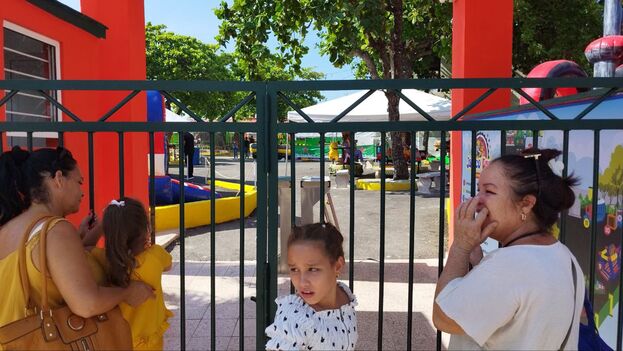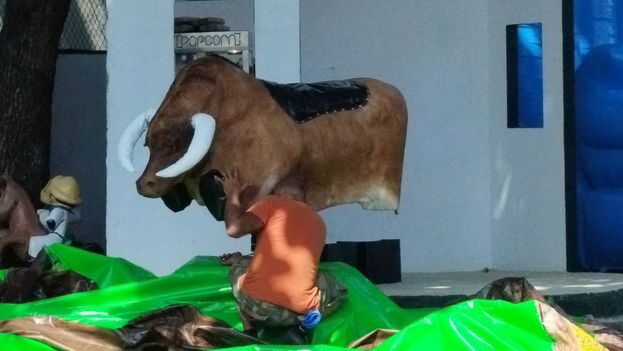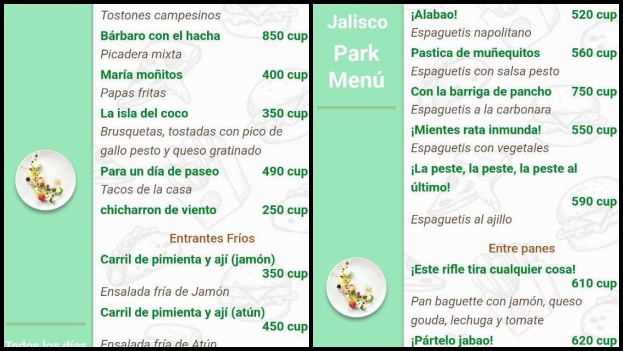
![]() 14ymedio, Juan Diego Rodríguez, Havana, 31 July 2023 — “There’s nothing private about this.” Distrust of the new Jalisco Park in Havana, 48 hours after it was reopened under new management, is widespread. Not surprisingly, the reopening has been marked by discontent and setbacks. The most recent one happened this Monday, when the establishment did not open at its scheduled time, nine in the morning, but more than an hour and a half later.
14ymedio, Juan Diego Rodríguez, Havana, 31 July 2023 — “There’s nothing private about this.” Distrust of the new Jalisco Park in Havana, 48 hours after it was reopened under new management, is widespread. Not surprisingly, the reopening has been marked by discontent and setbacks. The most recent one happened this Monday, when the establishment did not open at its scheduled time, nine in the morning, but more than an hour and a half later.
“There was a voltage problem and the electricians are solving it,” a woman identified as the head explained to the various families who had been waiting impatiently at the gate since early morning. “If we can’t solve it, at 10:30 we open with what we have so that the children don’t continue to despair,” she reassured those present.
Shortly after the clock struck that time, and before opening, a worker asked the families if someone could lend him some tools “to adjust some devices that make a lot of noise.” A father who had come by car with his children agreed and passed them through the gate, before the astonished gaze of the people.

Several electrical devices were damaged, although they did not specify if it was the result of a blackout, a bad installation or an overload. From outside, in fact, an employee was observed adjusting “El Toro Mecánico” [The Mechanical Bull], one of the most expensive attractions in the place, at 50 pesos a ride.
It is precisely the prices that have been one of the constant complaints from the public since the reopening of the establishment, located at the corner of 23rd and 18th in El Vedado, was announced, initially for July 26, although it was finally postponed, without explanations, until Saturday.
At first, many users complained about the requirement to pay for a ticket to enter the park (50 pesos for both children and adults), and then to pay again for each ride on the attractions (between 30 and 50 pesos). Thus, a few hours before the Jalisco Park reopened, it was reported that admission would be free for children.

But what has really ignited the annoyance of the attendees is the cost of the food. The hors d’oeuvres range from 450 to 600 pesos, and the pastas, from 500 (Neapolitan spaghetti) to 750 pesos (carbonara). The cheapest thing on the menu was a bun with ham and cheese (220 pesos), a chicharrón al viento [fried pork skins] (250 pesos) and a scoop of ice cream, in a bowl or in a cone, for 280 pesos. A bag of chips could reach 380 pesos and one of cookies, 120.
All the foods have names related to Cuban television cartoons – “I have a banana truck” (peasant plantains, referring to the children’s song), “You lie, filthy rat” (spaghetti with vegetables, taken from the cartoon series The brave ones), “The plague, the plague, the last plague” (garlic spaghetti, from the cry of the evil mouse from Captain Plin) or “Fumiga, Paquito, Fumiga” (pork hamburger, from one of the sayings of Chuncha), supposedly funny.
This detail was not funny at all, however, judging by the faces of the very few customers in the food service area. “What kind of a joke is it, if these prices are so disrespectful,” lamented a mother who, together with her husband and her son, could only buy one scoop of ice cream.

Another repeated complaint was the slowness with which everything works when, in other private companies, what stands out the most is the efficiency of management. This ineffectiveness was evident in the large lines, both to enter and to buy the little tokens necessary to enjoy the park’s offerings (green for a package of corn flakes, blue for inflatables and red for the most expensive attractions, the electrical). “This just like standing in line for chicken or the ATM,” quipped a young woman who was leading her daughter by the hand.
The number of employees was also striking. The security men, grumpy, and wearing black sweaters; the rest, with other types of uniforms, with more colors and with the name of the cartoon character Elpidio Valdés – a predominant presence in the new Jalisco Park – but equally reluctant. This is another difference with respect to private businesses that are usually seen in the capital.

In any case, there will be very few families who can afford to spend the day in the place. Adding transportation, adult tickets, three or four attractions, food and drinks, the bill easily reaches between 3,000 and 4,000 pesos, the average monthly salary of a state worker.
The recreational complex is managed, according to the official press, by the Beijing non-agricultural cooperative “in the form of lease.” Clients are reluctant to believe that it is a private institution. Thus, a young man from Central Havana who came with his nephews and who asserted: “They may say that it is a cooperative, this and that, but what it seems is another state invention to extort the people.”
____________
COLLABORATE WITH OUR WORK: The 14ymedio team is committed to practicing serious journalism that reflects Cuba’s reality in all its depth. Thank you for joining us on this long journey. We invite you to continue supporting us by becoming a member of 14ymedio now. Together we can continue transforming journalism in Cuba.
